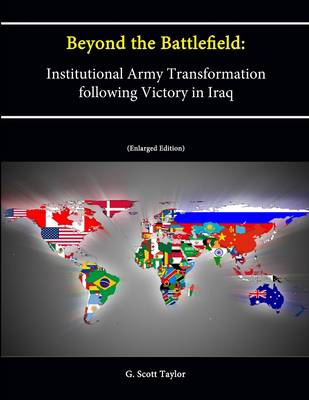
- Afhalen na 1 uur in een winkel met voorraad
- Gratis thuislevering in België vanaf € 30
- Ruim aanbod met 7 miljoen producten
- Afhalen na 1 uur in een winkel met voorraad
- Gratis thuislevering in België vanaf € 30
- Ruim aanbod met 7 miljoen producten
Zoeken
Beyond the Battlefield
Institutional Army Transformation following Victory in Iraq (Enlarged Edition)
G Scott Taylor, Strategic Studies Institute, U S Army War College
Paperback | Engels
€ 25,95
+ 51 punten
Omschrijving
The U.S. Army goes to great lengths to capture lessons learned and preserve these lessons for current practitioners and future generations. Though the Army is one of the most self-critical organizations found in American society, a well-deserved reputation has also been earned for failing to inculcate those lessons by transforming the institutional Army. Change is achieved through a continuous cycle of adaptive innovation, experimentation, and experience. In Iraq, out of necessity while in contact with a dynamic enemy, the Army transformed on the battlefield with radical changes in doctrine, organization, training, and materiel, which significantly enabled battlefield success. Writing as forces were withdrawing from Iraq at the end of 2011, the author analyzes the success of the military's counterinsurgency strategy and nation building efforts, examines the future of combat which the Army may face in order to recommend a suitable force posture...
Specificaties
Betrokkenen
- Auteur(s):
- Uitgeverij:
Inhoud
- Aantal bladzijden:
- 88
- Taal:
- Engels
Eigenschappen
- Productcode (EAN):
- 9781304071989
- Verschijningsdatum:
- 25/05/2013
- Uitvoering:
- Paperback
- Formaat:
- Trade paperback (VS)
- Afmetingen:
- 216 mm x 279 mm
- Gewicht:
- 226 g

Alleen bij Standaard Boekhandel
+ 51 punten op je klantenkaart van Standaard Boekhandel
Beoordelingen
We publiceren alleen reviews die voldoen aan de voorwaarden voor reviews. Bekijk onze voorwaarden voor reviews.











